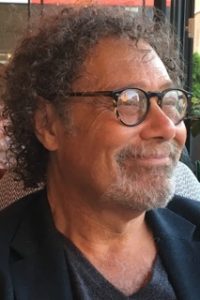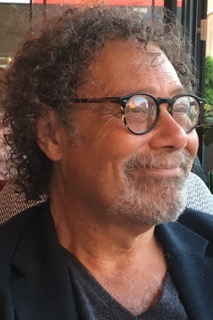Arts and Culture: For a Transformational Jewish Community
This week’s post is by David Y. Chack, is Producing Artistic Director of ShPIeL-Performing Identity in Chicago and Artistic Director of Bunbury-ShPIeL Identity Theatre Project in Louisville, KY.
Religious life and the arts have always been hand in glove with each other. The expressions of spiritual 
Judaism has its own examples of this, where ancient celebrations of Sukkot were performances comparable to arts festivals of today, performing circus-style events, dances of all kinds, flaming torches, and rituals involving wine, water, the resurrection of the dead after the destruction of the world by the great flood, and finding Israelite redemption at the ancient Temple after wandering in the desert. The rabbinic tradition suggests that there was no higher joy (chag simchateinu) than these performances. Clearly, this is a “performed” covenantal mythos connecting peoplehood to a spiritually transcendent narrative.
Rabbi Sid’s essay in Jewish Megatrends argues that we are losing Jews from our community because they are either not engaged or alienated by what Jewish institutions are “preaching.” Ironically, at the same time, the Jewish community gives less and less support and acknowledgement to Jewish arts and culture that was once seen as a necessary part of our Jewish communal experience. Once Jewish organizations received significant financial support and actively helped deliver and provide opportunities for creating and producing Jewish culture. But more recently, there is little to no financial support for the Jewish arts and culture sector from the Jewish community, as Jews have become more assimilated. Yet Jewish names abound as patrons of music, theatre, dance and art at secular institutions.
The Jewish community is also losing many artistically gifted Jews because they have no touchstone for their identities to join with their creativity and talent. There have been, and still are, so many Jews in the arts transforming music, dance, musical theatre, dramas, comedies and performances of all kinds. And so many have created work that comes from their Jewish identities. But just like the “nones” in recent demographic studies, they are feeling more and more disengaged and alienated as Jews. This has been my frustration throughout my career, knowing that Jewish arts and culture leads not only to personal satisfaction but to a deeper sense of connection to who we are as a people, and yet these very creative people are slipping away.
My expertise is in theatre. Let me offer two examples of how Jewish arts and culture can build community. The play The Dybbuk is often seen today as a play about Jewish superstitions and fanaticism. This play was actually revolutionary in world theatre in the 1920s, coming out of the best of Russian and Polish theatre at the time. From a script by S. Ansky, it was produced simultaneously in Poland (in Yiddish) and in Moscow (in Hebrew) at the world-famous Moscow Art Theatre, which then spun off a Jewish theatre troupe that became the Habima Theatre, now located in Tel-Aviv.
Ansky wrote the play from material he had collected in an early (1912-14) Jewish ethnographic study about cultural survival. Combining his ethnographic work with highly trained actors and directors, he created a great theatre work of passion bringing the Jewish community and the larger community together. This is an example of how a strongly Jewish themed work, combined with highly trained theatre artists, creates both fine art, community, and is transformative for survival and supportive of Jewish identity.
Another such example is the recent New York and national tour of the play Indecent by Paula Vogel and Rebecca Taichman (won the Tony Award for Best Director). It is about the historic opening of the first Yiddish play on Broadway, God of Vengeance, in 1923. The play was written originally for the Yiddish Theatre but was shut down for depicting a lesbian love relationship. Indecent is based on that particular moment in time of Jewish and American cultural history. And its innovative adaptation of God of Vengeance provides a lens for viewing society in our moment in time with all of its social ills– patriarchal structures needing to be replaced; inflexible gender roles; harassment of women; anti-Semitism; and Yiddish culture in exile. I worked on this production in Chicago as dramaturge, and I know of many people who loved it not only for its artistry, but for how, through the play, they could reclaim their Jewishness in our “here and now” since it spoke so directly to their Jewish identity today.
This “hereness” or doikayt in Yiddish, is essential in being a Jew and in seeking a connection to one’s identity as an ongoing search for what is authentic. The best art is done through that deep identity exploration and it forms the ways we think, the ways we love, the ways we interact with the world and the ways we live as human beings. This ties in with what Schwarz writes in Jewish Megatrends about how the “Jewish historical narrative and ethical legacy (are)…a source of inspiration and an important component of their (covenantal Jews) formative personal identity.”
Because the arts inherently exhibit a strong ethos of freedom of expression, it naturally promotes openness and inclusivity, even if that is seen as somewhat threatening to the defenders of older mores. Yet when grounded in an ongoing connection to primary Jewish sources, allowing for a revelatory process of spirituality, intellectual inquiry and cultural identity — this expressiveness goes beyond narrowing creative sensibilities and encourages, even advances, expression which can be both supportive of Jewish identity and can challenge archaic structures that are patriarchal or cater towards those with privilege.
Artists question, disrupt, complicate, are subversive, and challenge inherited notions of social, political, cultural, and religious hierarchy. They are concerned with personal and collective issues of the day. Therefore, the arts, either in performance or visual forms, embody that spirit of deep inquiry. As Jewish Megatrends lays out, art encourages and enables “seekers of wisdom” (dorshei chochma); “seekers of justice” (dorshei tzedek); “seekers of community” (dorshei kehilla), and “seekers of lives of sacred purpose” (dorshei kedusha).” The arts may not always change the world but they act as witnesses to society on issues like anti-Semitism, racism, xenophobia, gender exclusion, and supremacism of all kinds. This means that the arts hold up a mirror to society, challenging all forms of cultural misappropriations or oppression in language, structures, content, and activity.
Culture transmits the meaningful narratives that form a people, but culture, in order for that people to survive, must also be transformative. In ancient times at the Temple, the altar was the stage for meaningful rituals to be performed. Today’s contemporary stage, on which all forms of Jewish culture and arts are performed, can similarly be a place to experience deep meaning. It is where the ideas, values and narratives get represented and performed that are inspiring and continue to be transforming — even at times subversive. In an age when Jews increasingly resist and/or reject interpretations of Judaism, that they feel are imposed on them by hierarchical structures, Jewish culture and the arts are critically vital to find meaning for the Jewish people to meet the challenges ahead.
——————-
David Y. Chack, is on faculty at DePaul University/Chicago in Holocaust Theatre and Performance and Theatre of Identity including Jewish cultural theatre. He is Producing Artistic Director of ShPIeL-Performing Identity in Chicago and Artistic Director of Bunbury-ShPIeL Identity Theatre Project in Louisville, KY.


